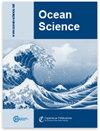Southern Ocean warming and Antarctic ice shelf melting in conditions plausible by late 23rd century in a high-end scenario
IF 3.3
3区 地球科学
Q2 METEOROLOGY & ATMOSPHERIC SCIENCES
引用次数: 0
Abstract
Abstract. How much Antarctic ice shelf basal melt rates can increase in response to global warming remains an open question. Here we describe the response of the Southern Ocean and ice shelf cavities to an abrupt change to high-end atmospheric conditions plausible by the late 23rd century under the SSP5-8.5 scenario. To achieve this objective, we first present and evaluate a new 0.25∘ global configuration of the NEMO (Nucleus for European Modelling of the Ocean NEMO System Team, 2019) ocean and sea ice model. Our present-day simulations demonstrate good agreement with observational data for key variables such as temperature, salinity, and ice shelf melt rates, despite the remaining difficulties to simulate the interannual variability in the Amundsen Sea. The ocean response to the high-end atmospheric perturbation includes a strengthening and extension of the Ross and Weddell gyres and a quasi-disappearance of sea ice, with a subsequent decrease in production of High Salinity Shelf Water and increased intrusion of warmer water onto the continental shelves favoured by changes in baroclinic currents at the shelf break. We propose to classify the perturbed continental shelf as a “warm–fresh shelf”. This induces a substantial increase in ice shelf basal melt rates, particularly in the coldest seas, with a total basal mass loss rising from 1180 to 15 700 Gt yr−1 and an Antarctica averaged melt rate increasing from 0.8 to 10.6 m yr−1. In the perturbed simulation, most ice shelves around Antarctica experience conditions that are currently found in the Amundsen Sea, while the Amundsen Sea warms by 2 ∘C. These idealised projections can be used as a base to calibrate basal melt parameterisations used in long-term ice sheet projections.南大洋变暖和南极冰架融化在 23 世纪晚期的高端设想方案中条件合理
摘要南极冰架的基底融化率能因全球变暖而增加多少仍然是一个悬而未决的问题。在此,我们描述了在 SSP5-8.5 情景下,南大洋和冰架空腔对 23 世纪末可能出现的高端大气条件突然变化的响应。为实现这一目标,我们首先介绍并评估了 NEMO(欧洲海洋建模核心 NEMO 系统团队,2019 年)海洋和海冰模型的新 0.25∘全球配置。尽管模拟阿蒙森海的年际变化仍然存在困难,但我们的现今模拟结果表明,温度、盐度和冰架融化率等关键变量与观测数据非常吻合。海洋对高端大气扰动的响应包括罗斯和韦德尔涡旋的加强和扩展,以及海冰的准消失,高盐度大陆架水的产量随之减少,大陆架断裂处的气压流变化导致更多暖水侵入大陆架。我们建议将受到扰动的大陆架归类为 "温暖-新鲜大陆架"。这导致冰架基底融化率大幅上升,尤其是在最寒冷的海域,总基底质量损失从 1180 千兆吨/年上升到 15700 千兆吨/年,南极洲平均融化率从 0.8 米/年上升到 10.6 米/年。在扰动模拟中,南极洲周围的大多数冰架都经历了目前在阿蒙森海发现的情况,而阿蒙森海的温度升高了 2 ∘C。这些理想化的预测可用作校准长期冰盖预测中使用的基底融化参数的基础。
本文章由计算机程序翻译,如有差异,请以英文原文为准。
求助全文
约1分钟内获得全文
求助全文
来源期刊

Ocean Science
地学-海洋学
CiteScore
5.90
自引率
6.20%
发文量
78
审稿时长
6-12 weeks
期刊介绍:
Ocean Science (OS) is a not-for-profit international open-access scientific journal dedicated to the publication and discussion of research articles, short communications, and review papers on all aspects of ocean science: experimental, theoretical, and laboratory. The primary objective is to publish a very high-quality scientific journal with free Internet-based access for researchers and other interested people throughout the world.
Electronic submission of articles is used to keep publication costs to a minimum. The costs will be covered by a moderate per-page charge paid by the authors. The peer-review process also makes use of the Internet. It includes an 8-week online discussion period with the original submitted manuscript and all comments. If accepted, the final revised paper will be published online.
Ocean Science covers the following fields: ocean physics (i.e. ocean structure, circulation, tides, and internal waves); ocean chemistry; biological oceanography; air–sea interactions; ocean models – physical, chemical, biological, and biochemical; coastal and shelf edge processes; paleooceanography.
 求助内容:
求助内容: 应助结果提醒方式:
应助结果提醒方式:


